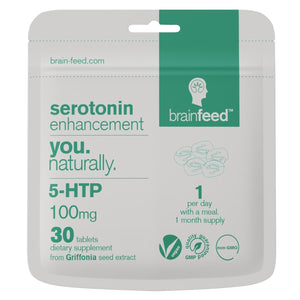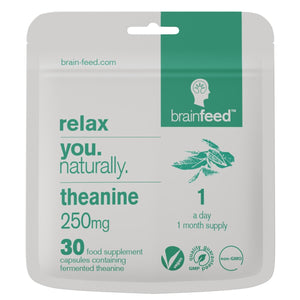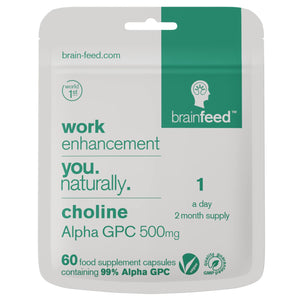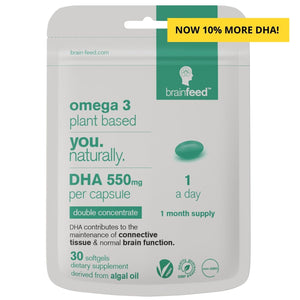How to improve mental wellbeing? Your brain chemicals hold the answers.
filter
The World Health Organization defines mental wellbeing as “a state of well-being in which the individual realizes his or her own abilities, can cope with the normal stresses of life, can work productively and fruitfully, and is able to make a contribution to his or her community” [1 Trusted Source 2001 - Geneva: World Health Organization 3rd-party source The world health report 2001: mental health: new understanding, new hope. ] . Your brain produces chemicals that contribute to your mental wellbeing. These include serotonin, dopamine, GABA, acetylcholine, and oxytocin. Many supplements for mental health aim to increase their levels to promote wellbeing. Though these brain chemicals perform a variety of functions in the body, they need to be produced exclusively in the brain for brain benefits.
Serotonin: the feel-good chemical
What is the best way to lift mood naturally? Increase your serotonin levels. Serotonin in the brain is responsible for regulating your mood and sleep-wake cycle. Researchers trying to answer the question of how to improve your mood focus primarily on the role of serotonin. Higher levels of serotonin are associated with better mood. Brain scans show that serotonin levels increase when participants were in a better mood and decreased during low mood [2 Trusted Source 2007 - Journal of psychiatry & neuroscience: JPN Human study In vivo measurements of brain trapping of 11C-labelled α-methyl-L-tryptophan during acute changes in mood states ] , [3 Trusted Source 2013 - Nutrition Research Reviews 3rd-party source Food-derived serotonergic modulators: effects on mood and cognition ] .
Serotonin is produced from tryptophan, a building block of protein. Once consumed, tryptophan is converted to 5-HTP which is then converted to serotonin (5-HT).
Ways to increase serotonin levels:
-
Increase tryptophan intake
Foods high in tryptophan include (per 100g): Frozen dried tofu (750mg), Chia seeds (720mg), pork (630mg), mozzarella cheese (600mg) and chicken (380mg). Your body uses less than 3% of food’s tryptophan to make brain serotonin [4 Trusted Source 2019 - Biochimie Research evaluation Serotonin in the gut: Blessing or a curse ] . -
Supplement with 5-HTP
This is the efficient way to increase serotonin levels because 5-HTP can easily enter the brain and is directly converted to serotonin. -
Exposure to bright light
:Exposure to light activates serotonin production [5 Trusted Source 2013 - Innovations in Clinical Neuroscience Research evaluation Sunshine, Serotonin, and Skin: A Partial Explanation for Seasonal Patterns in Psychopathology? ] . The NHS recommends this as a treatment of Seasonal Affective Disorder (SAD) which is accompanied by low mood [6 Trusted Source 2021 - NHS https://docs.google.com/document/d/1Y6-DzqrsgYzkpXOEm61LZNeN-zTISpgs/edit Treatment - Seasonal affective disorder (SAD) ] . A general recommendation is exposure to 10,000 lux (measure of intensity of brightness) for 30 minutes per day [7 Trusted Source 2017 - The Einstein journal of biology and medicine : EJBM Research evaluation Bright Light Therapy: Seasonal Affective Disorder and Beyond ] .
brain feed’s 100mg 5-htp supplement is extracted and isolated from Ghanian Griffonia Simplicifolia seeds. 98% of the tablet is comprised of 5-htp making it the smallest, nutrient-dense tablet available and no unnecessary bulking agents.
Dopamine: the reward and pleasure chemical
Good food, sex, socializing, thrill-seeking and other activities that give you a sense of reward and pleasure, are courtesy of dopamine. Dopamine contributes to mental wellbeing by motivating and challenging you. Studies [8 Trusted Source 2012 - The Journal of Neuroscience Human study Dopaminergic Mechanisms of Individual Differences in Human Effort-Based Decision-Making ] , [9 Trusted Source 2019 - Proceedings of the National Academy of Sciences Human study Endogenous fluctuations in the dopaminergic midbrain drive behavioral choice variability ] , [10 Trusted Source 2006 - Neuron Research evaluation Absolute coding of stimulus novelty in the human substantia nigra/VTA ] found higher dopamine levels in motivated individuals and in response to challenging tasks and new experiences.
Dopamine is produced from L-tyrosine (building block of protein), found in protein rich foods. L-tyrosine enters the brain and is converted to L-DOPA which is converted to dopamine.
Ways to increase dopamine levels
-
Increase tyrosine intake:
Foods high in L-tyrosine include (per 100g): Parmesan cheese (2300mg), frozen dried tofu (1800mg), beef steak (1200mg), egg (500mg). For those with inadequate dietary intake or restrictions, L-tyrosine can be taken in supplemental form to increase dopamine levels. -
Exercise regularly
Aerobic exercise like walking, running, and swimming increases dopamine levels [11 Trusted Source 2016 - Frontiers in psychology Research evaluation Neuromodulation of Aerobic Exercise—A Review ] . Animal studies found that exercising increased dopamine levels by 40% and the levels stayed high for a week [12 Trusted Source 2022 - The Journal of Neuroscience Animal study Voluntary Exercise Boosts Striatal Dopamine Release: Evidence for the Necessary and Sufficient Role of BDNF ] . Another study found exercising for 2 hours increased dopamine levels by 30% [13 Trusted Source 2003 - Neurobiology of Disease Research evaluation Regulation of brain function by exercise ] . Exercise is a great way to increase serotonin and dopamine levels. -
Practice meditation
Meditation, an act of mindfulness, has shown to increase dopamine levels by 65% during a single hourly session [14 Trusted Source 2002 - Brain Research. Cognitive Brain Research Human study Increased dopamine tone during meditation-induced change of consciousness ]
brain feed has created the world’s 1st natural 800mg tyrosine capsule from fermented corn. Read more about it here.

GABA: the relaxation chemical
GABA is the main relaxation brain chemical that maintains the balance against excitatory brain chemicals [15 Trusted Source 2015 - Neuropsychiatric Disease and Treatment Research evaluation Anxiety disorders and GABA neurotransmission: a disturbance of modulation ] . Low stress levels are needed to maintain optimal GABA levels [16 Trusted Source 2018 - Frontiers in Neuroscience Systematic and meta-analysis Stress in Regulation of GABA Amygdala System and Relevance to Neuropsychiatric Diseases ] . Food sources like kimchi, sourdough, fermented fish, and white tea can provide small amounts of GABA, but only a small amount can enter the brain [17 Trusted Source 2015 - Frontiers in Psychology Research evaluation Neurotransmitters as food supplements: the effects of GABA on brain and behavior ]
L-theanine is a nutrient found in green tea, which easily enters the brain and has an effect within 30 minutes [18 Trusted Source 2008 - Asia Pacific Journal of Clinical Nutrition Human study L-theanine, a natural constituent in tea, and its effect on mental state ] . L-theanine can increase the relative concentration of GABA and promote relaxation without sedation [19 Trusted Source 2016 - Nutrients Human study Anti-Stress, Behavioural and Magnetoencephalography Effects of an l-Theanine-Based Nutrient Drink: A Randomised, Double-Blind, Placebo-Controlled, Crossover Trial ] .
Ways to increase GABA levels
-
Increase L-theanine intake:
15 years’ worth of research evidence found that regular intake of 200-400mg L-theanine (13-26 cups of tea) for 2 weeks reduced stress and had a calming effect [20 Trusted Source 2019 - Pharmacological Research Systematic and meta-analysis Psychotropic effects of L-theanine and its clinical properties: From the management of anxiety and stress to a potential use in schizophrenia ] . A high dose that is effective is easier to achieve through L-theanine supplementation, compared to drinking many cups of tea. -
Practice yoga:
Practising yoga for an hour, three times a week is shown to increase GABA levels by 13%-27%, based on the level of experience [21 Trusted Source 2010 - The Journal of Alternative and Complementary Medicine Human study Effects of Yoga Versus Walking on Mood, Anxiety, and Brain GABA Levels: A Randomized Controlled MRS Study ] .
brain feed’s 250 mg L-theanine is a natural fermented form and each capsule contains L-theanine equivalent to 15-20 cups of green tea.
Acetylcholine: the memory and attention brain chemical
Acetylcholine is a fast-acting brain chemical that is involved in learning, memory, focus and attention tasks [22 Trusted Source 2012 - Neuron Research evaluation Acetylcholine as a neuromodulator: cholinergic signaling shapes nervous system function and behavior ] . Increasing acetylcholine levels improved memory recall during tests, reaction times and number of tasks completed [23 Trusted Source 2016 - J. Biochem. Mol. Biol Animal study Relationship between memory improvement and brain acetylcholine following chronic choline supplementation in rats ] , [24 Trusted Source 2011 - Neuron Research evaluation Acetylcholine as a neuromodulator: cholinergic signaling shapes nervous system function and behavior ] and a high amount of acetylcholine is released in brain areas that process short term memory for long term retention [25 Trusted Source 2017 - Journal of Neurochemistry Research evaluation Cholinergic modulation of the hippocampal region and memory function ] .
Acetylcholine is produced from choline, a nutrient found in protein-rich foods. Those with low choline intake can take it in supplemental form, with the best available one being Alpha GPC. Alpha GPC is 41% choline by weight and increases acetylcholine levels faster than other forms of choline. It can freely enter the brain to increase acetylcholine levels in 1-3 hours after intake [26 Trusted Source 2023 - Examine 3rd-party source Alpha GPC ] .
Ways to increase acetylcholine levels:
-
Increase choline intake
Foods high in choline include (per 100g): beef liver (426mg), fried egg (273mg), smoked salmon (224mg), dried shiitake mushrooms (202mg). -
Supplement with Alpha GPC
:Alpha GPC is an efficient form of choline needed to increase acetylcholine levels. Choline supplementation is shown to improve working memory, even in alcohol-damaged brains [27 Trusted Source 2017 - Nutrients Animal study Choline and Working Memory Training Improve Cognitive Deficits Caused by Prenatal Exposure to Ethanol ] .
brain feed has created the world’s 1st 500mg Alpha GPC capsule containing 99% Alpha GPC* (the purest form of Alpha GPC).
Oxytocin: the bonding chemical
Oxytocin is a hormone that is intimately involved in social bonding and promoting trust [28 Trusted Source 2010 - CNS neuroscience & therapeutics Research evaluation REVIEW: Oxytocin: Crossing the Bridge between Basic Science and Pharmacotherapy ] . It decreases stress and anxiety by promoting familiarity and bonding. It is referred to as “love hormone” due to its role in romantic attachment [29 Trusted Source 2019 - MOJ Anatomy & Physiology 3rd-party source Oxytocin-functions: an overview ] . It is also involved in sexual and reproductive functions.
Ways to increase oxytocin levels:
- Embrace your loved ones: Hugging a loved one or a pet is shown to increase oxytocin levels due to increased bonding experience
- Volunteer: Positive social interactions like giving charity and volunteering for a cause increase oxytocin levels [30 Trusted Source 2022 - Frontiers in Behavioral Neuroscience Human study Oxytocin Release Increases With Age and Is Associated With Life Satisfaction and Prosocial Behaviors ] .
- Sing: Singing, regardless of whether you are an amateur or professional, increases oxytocin levels [31 Trusted Source 2003 - Integrative physiological and behavioral science : the official journal of the Pavlovian Society Human study Does singing promote well-being?: An empirical study of professional and amateur singers during a singing lesson ]
- Get a massage: 15 mins of moderate pressure massage was shown to promote calmness and increase oxytocin levels [32 Trusted Source 2012 - Alternative Therapies in Health and Medicine Human study Massage increases oxytocin and reduces adrenocorticotropin hormone in humans ] .
Boost your brain health with omega 3
Algae-derived DHA provides people with omega 3 and offers a wide range of health benefits. The European Food Safety Authority supports multiple health claims regarding DHA’s benefits on cardiovascular health, cognitive function and eye health for adults, unborn children, breastfed infants and older infants[33 Trusted Source 2010 - European Food Safety Authority Journal Research evaluation Scientific Opinion on the substantiation of health claims related to eicosapentaenoic acid (EPA), docosahexaenoic acid (DHA), docosapentaenoic acid (DPA) and maintenance of normal cardiac function (ID 504, 506, 516, 527, 538, 703, 1128, 1317, 1324, 1325), maintenance of normal blood glucose concentrations (ID 566), maintenance of normal blood pressure (ID 506, 516, 703, 1317, 1324), maintenance of normal blood HDL-cholesterol concentrations (ID 506), maintenance of normal (fasting) blood concentrations of triglycerides (ID 506, 527, 538, 1317, 1324, 1325), maintenance of normal blood LDL-cholesterol concentrations (ID 527, 538, 1317, 1325, 4689), protection of the skin from photo-oxidative (UV-induced) damage (ID 530), improved absorption of EPA and DHA (ID 522, 523), contribution to the normal function of the immune system by decreasing the levels of eicosanoids, arachidonic acid-derived mediators and pro-inflammatory cytokines (ID 520, 2914), and “immunomodulating agent” (4690) pursuant to Article 13(1) of Regulation (EC) No 1924/2006 ] , [34 Trusted Source 2011 - European Food Safety Authority Journal Research evaluation Scientific Opinion on the substantiation of health claims related to docosahexaenoic acid (DHA), eicosapentaenoic acid (EPA) and brain, eye and nerve development (ID 501, 513, 540), maintenance of normal brain function (ID 497, 501, 510, 513, 519, 521, 534, 540, 688, 1323, 1360, 4294), maintenance of normal vision (ID 508, 510, 513, 519, 529, 540, 688, 2905, 4294), maintenance of normal cardiac function (ID 510, 688, 1360), “maternal health; pregnancy and nursing” (ID 514), “to fulfil increased omega-3 fatty acids need during pregnancy” (ID 539), “skin and digestive tract epithelial cells maintenance” (ID 525), enhancement of mood (ID 536), “membranes cell structure” (ID 4295), “anti-inflammatory action” (ID 4688) and maintenance of normal blood LDL-cholesterol concentrations (ID 4719) pursuant to Article 13(1) of Regulation (EC) No 1924/2006 ] , [35 Trusted Source 2009 - European Food Safety Authority Journal Research evaluation DHA and support of the cognitive development of the unborn child and breastfed infant ‐ Scientific substantiation of a health claim related to DHA and support of the cognitive development of the unborn child and breastfed infant pursuant to Article 14 of Regulation (EC) No 1924/2006 ] , [36 Trusted Source 2011 - European Food Safety Authority Journal Research evaluation Scientific Opinion on health claims already evaluated (ID 215, 568, 674, 712, 1398, 1633, 1974, 4191, 4192, 4193, 4236, 4335, 4698, 4704) pursuant to Article 13(1) of Regulation (EC) No 1924/2006 ] , [37 Trusted Source 2009 - European Food Safety Authority Journal Research evaluation DHA and support of the visual development of the unborn child and breastfed infant ‐ Scientific substantiation of a health claim related to DHA and support of the visual development of the unborn child and breastfed infant pursuant to Article 14 of Regulation (EC) No 1924/2006 ] . EFSA claims DHA contributes to the maintenance of normal brain function and maternal intake contributes to the normal brain development of the foetus and breastfed infants[34 Trusted Source 2011 - European Food Safety Authority Journal Research evaluation Scientific Opinion on the substantiation of health claims related to docosahexaenoic acid (DHA), eicosapentaenoic acid (EPA) and brain, eye and nerve development (ID 501, 513, 540), maintenance of normal brain function (ID 497, 501, 510, 513, 519, 521, 534, 540, 688, 1323, 1360, 4294), maintenance of normal vision (ID 508, 510, 513, 519, 529, 540, 688, 2905, 4294), maintenance of normal cardiac function (ID 510, 688, 1360), “maternal health; pregnancy and nursing” (ID 514), “to fulfil increased omega-3 fatty acids need during pregnancy” (ID 539), “skin and digestive tract epithelial cells maintenance” (ID 525), enhancement of mood (ID 536), “membranes cell structure” (ID 4295), “anti-inflammatory action” (ID 4688) and maintenance of normal blood LDL-cholesterol concentrations (ID 4719) pursuant to Article 13(1) of Regulation (EC) No 1924/2006 ] , [35 Trusted Source 2009 - European Food Safety Authority Journal Research evaluation DHA and support of the cognitive development of the unborn child and breastfed infant ‐ Scientific substantiation of a health claim related to DHA and support of the cognitive development of the unborn child and breastfed infant pursuant to Article 14 of Regulation (EC) No 1924/2006 ] . A literature review showed that adequate dietary consumption of omega 3 fats is necessary for optimal cognitive performance, making algae-derived DHA an excellent choice for brain support[38 Trusted Source 2014 - Military Medicine Systematic and meta-analysis Long-Chain Omega-3 Fatty Acids and Optimization of Cognitive Performance ] . Wondering where do you get omega 3 from algae and how to make sure you’re daily intake is adequate?
Ways to increase DHA levels:
-
Increase omega 3 intake
EFSA recommends a daily intake of at least 250 milligrams of EPA and DHA combined for adults. This can be achieved through two servings of fatty fish per week, such as salmon, mackerel or trout. -
Supplement with DHA
For vegetarians, vegans and pregnant or breastfeeding mothers, omega-3 supplements are a viable option.
brain feed developed a sustainable omega 3 supplement from algae oil which provides you with 500 mg of DHA in a vegan capsule.
Get additional 15% off your 1st order using code 'NEW15'.
References
- World Health Organization. The world health report 2001: mental health: new understanding, new hope. Geneva: World Health Organization; 2001. https://www.ncbi.nlm.nih.gov/pmc/articles/PMC2566704/pdf/0042_9686_79_11_1085.pdf
- Perreau-Linck, E. et al. (2007). In vivo measurements of brain trapping of C-labelled alpha-methyl-L-tryptophan during acute changes in mood states. Journal of psychiatry & neuroscience: JPN, [online] 32(6), pp.430–434. https://www.ncbi.nlm.nih.gov/pmc/articles/PMC2077345/
- Hulsken, S. et al. (2013). Food-derived serotonergic modulators: effects on mood and cognition. Nutrition Research Reviews, 26(2), pp.223–234. https://www.cambridge.org/core/journals/nutrition-research-reviews/article/foodderived-serotonergic-modulators-effects-on-mood-and-cognition/642CE70022F0BF466BAC6F6BF6A19430
- Banskota, S. et al. (2019). Serotonin in the gut: Blessing or a curse. Biochimie, [online] 161, pp.56–64. https://www.sciencedirect.com/science/article/abs/pii/S0300908418301652?via%3Dihub.
- Sansone, R.A. et al. (2013). Sunshine, Serotonin, and Skin: A Partial Explanation for Seasonal Patterns in Psychopathology? Innovations in Clinical Neuroscience, [online] 10(7-8), pp.20–24. https://www.researchgate.net/publication/256985999_Sunshine_Serotonin_and_Skin_A_Partial_Explanation_for_Seasonal_Patterns_in_Psychopathology
- NHS (2021). Treatment - Seasonal Affective Disorder (SAD). [online] nhs.uk. https://www.nhs.uk/mental-health/conditions/seasonal-affective-disorder-sad/treatment/
- Campbell, P.D. et al. (2017). Bright Light Therapy: Seasonal Affective Disorder and Beyond. The Einstein journal of biology and medicine : EJBM, [online] 32, pp.E13–E25. https://www.ncbi.nlm.nih.gov/pmc/articles/PMC6746555/
- Treadway, M.T. et al. (2012). Dopaminergic Mechanisms of Individual Differences in Human Effort-Based Decision-Making. The Journal of Neuroscience, [online] 32(18), pp.6170–6176. https://www.jneurosci.org/content/32/18/6170
- Chew, B. et al. (2019). Endogenous fluctuations in the dopaminergic midbrain drive behavioral choice variability. Proceedings of the National Academy of Sciences, 116(37), pp.18732–18737. https://www.pnas.org/doi/full/10.1073/pnas.1900872116
- Bunzeck, N. et al. (2006). Absolute Coding of Stimulus Novelty in the Human Substantia Nigra/VTA. Neuron, 51(3), pp.369–379. https://www.cell.com/neuron/fulltext/S0896-6273(06)00475-2?_returnURL=https%3A%2F%2Flinkinghub.elsevier.com%2Fretrieve%2Fpii%2FS0896627306004752%3Fshowall%3Dtrue
- Heijnen, S. et al. (2016). Neuromodulation of Aerobic Exercise-A Review. Frontiers in psychology, 6, 1890. https://www.frontiersin.org/journals/psychology/articles/10.3389/fpsyg.2015.01890/full
- Bastioli, G. et al. (2022). Voluntary Exercise Boosts Striatal Dopamine Release: Evidence for the Necessary and Sufficient Role of BDNF. Journal of Neuroscience, [online] 42(23), pp.4725–4736. https://www.jneurosci.org/content/42/23/4725
- Sutoo, D. et al. (2003). Regulation of brain function by exercise. Neurobiology of Disease, [online] 13(1), pp.1–14. https://www.sciencedirect.com/science/article/abs/pii/S0969996103000305?via%3Dihub
- Kjaer, T.W. et al. (2002). Increased dopamine tone during meditation-induced change of consciousness. Cognitive Brain Research, [online] 13(2), pp.255–259. https://www.sciencedirect.com/science/article/abs/pii/S0926641001001069?via%3Dihub
- Nuss, P. (2015). Anxiety disorders and GABA neurotransmission: a disturbance of modulation. Neuropsychiatric Disease and Treatment, [online] 11, p.165. https://www.dovepress.com/anxiety-disorders-and-gaba-neurotransmission-a-disturbance-of-modulati-peer-reviewed-fulltext-article-NDT
- Jie, F. et al. (2018). Stress in Regulation of GABA Amygdala System and Relevance to Neuropsychiatric Diseases. Frontiers in Neuroscience, 12 https://www.frontiersin.org/journals/neuroscience/articles/10.3389/fnins.2018.00562/full
- Boonstra, E. et al. (2015). Neurotransmitters as food supplements: the effects of GABA on brain and behavior. Frontiers in Psychology, [online] 6. https://www.frontiersin.org/journals/psychology/articles/10.3389/fpsyg.2015.01520/full
- Nobre, A. et al. (2008). L-theanine, a natural constituent in tea, and its effect on mental state. Asia Pac J Clin Nutr, [online] 17(S1), pp.167–168. https://apjcn.nhri.org.tw/server/APJCN/17%20Suppl%201/167.pdf
- White, D. et al. (2016). Anti-Stress, Behavioural and Magnetoencephalography Effects of an l-Theanine-Based Nutrient Drink: A Randomised, Double-Blind, Placebo-Controlled, Crossover Trial. Nutrients, [online] 8(1), p.53. https://www.mdpi.com/2072-6643/8/1/53
- Lopes Sakamoto, F. et al. (2019). Psychotropic effects of L-theanine and its clinical properties: From the management of anxiety and stress to a potential use in schizophrenia. Pharmacological Research, 147, p.104395. https://www.sciencedirect.com/science/article/abs/pii/S1043661819307790?via%3Dihub
- Streeter, C.C. et al. (2010). Effects of Yoga Versus Walking on Mood, Anxiety, and Brain GABA Levels: A Randomized Controlled MRS Study. The Journal of Alternative and Complementary Medicine, 16(11), pp.1145–1152. https://www.liebertpub.com/doi/10.1089/acm.2010.0007
- Picciotto, Marina R. et al. (2012). Acetylcholine as a Neuromodulator: Cholinergic Signaling Shapes Nervous System Function and Behavior. Neuron, [online] 76(1), pp.116–129. https://www.cell.com/neuron/fulltext/S0896-6273(12)00802-1?_returnURL=https%3A%2F%2Flinkinghub.elsevier.com%2Fretrieve%2Fpii%2FS0896627312008021%3Fshowall%3Dtrue
- Tabassum, S. et al. (2016). Relationship between memory improvement and brain acetylcholine following chronic choline supplementation in rats. J. Biochem. Mol. Biol, [online] 49(2), pp.40–47. http://www.pjbmb.org.pk/images/PJBMBArchive/2016/PJBMB_49_2_Jun_2016/02.pdf
- Klinkenberg, I. et al. (2011). Acetylcholine and attention. Behavioural brain research, [online] 221(2), pp.430–42. https://www.sciencedirect.com/science/article/abs/pii/S0166432810007588?via%3Dihub
- Haam, J. et al. (2017). Cholinergic modulation of the hippocampal region and memory function. Journal of Neurochemistry, 142, pp.111–121. https://onlinelibrary.wiley.com/doi/10.1111/jnc.14052
- Murray, M. (2023). Alpha GPC. Examine. https://examine.com/supplements/alpha-gpc/?srsltid=AfmBOoovovPsgvo5p6F4mc3pGFxD7ctYXJPtraVjoByJR1ZPB-G1NC7t
- Waddell, J. et al. (2017). Choline and Working Memory Training Improve Cognitive Deficits Caused by Prenatal Exposure to Ethanol. Nutrients, 9(10). https://www.mdpi.com/2072-6643/9/10/1080
- Viero, C. et al. (2010). REVIEW: Oxytocin: Crossing the bridge between basic science and pharmacotherapy. CNS neuroscience & therapeutics, 16(5), e138–e156. https://onlinelibrary.wiley.com/doi/10.1111/j.1755-5949.2010.00185.x
- JK, M. et al. (2019). Oxytocin-functions: an overview. MOJ Anatomy & Physiology, 6(4). https://medcraveonline.com/MOJAP/oxytocin-functions-an-overview.html
- Zak, P. J. et al. (2022). Oxytocin Release Increases With Age and Is Associated With Life Satisfaction and Prosocial Behaviors. Frontiers in behavioral neuroscience, 16, 846234. https://www.frontiersin.org/journals/behavioral-neuroscience/articles/10.3389/fnbeh.2022.846234/full
- Grape, C. et al. (2003). Does singing promote well-being?: An empirical study of professional and amateur singers during a singing lesson. Integrative physiological and behavioral science : the official journal of the Pavlovian Society, 38(1), 65–74. https://link.springer.com/article/10.1007/BF02734261
- Morhenn, V., Beavin, L. E., & Zak, P. J. (2012). Massage increases oxytocin and reduces adrenocorticotropin hormone in humans. Alternative therapies in health and medicine, 18(6), 11–18. https://todayspractitioner.com/wp-content/uploads/2013/10/Massage-Increases-Oxytocin-and-Reduces-Adrenocorticotropin-Hormone-in-Humans-ATHM_18_6_p11_18Morhenn1.pdf
-
European Food Safety Authority. (2010). Scientific Opinion on the substantiation of health claims related to eicosapentaenoic acid (EPA), docosahexaenoic acid (DHA), docosapentaenoic acid (DPA) and maintenance of normal cardiac function (ID 504, 506, 516, 527, 538, 703, 1128, 1317, 1324, 1325), maintenance of normal blood glucose concentrations (ID 566), maintenance of normal blood pressure (ID 506, 516, 703, 1317, 1324), maintenance of normal blood HDL-cholesterol concentrations (ID 506), maintenance of normal (fasting) blood concentrations of triglycerides (ID 506, 527, 538, 1317, 1324, 1325), maintenance of normal blood LDL-cholesterol concentrations (ID 527, 538, 1317, 1325, 4689), protection of the skin from photo-oxidative (UV-induced) damage (ID 530), improved absorption of EPA and DHA (ID 522, 523), contribution to the normal function of the immune system by decreasing the levels of eicosanoids, arachidonic acid-derived mediators and pro-inflammatory cytokines (ID 520, 2914), and “immunomodulating agent” (4690) pursuant to Article 13(1) of Regulation (EC) No 1924/2006. EFSA Journal, 8(10), 1796. https://www.efsa.europa.eu/en/efsajournal/pub/1796
-
European Food Safety Authority. (2011). Scientific Opinion on the substantiation of health claims related to docosahexaenoic acid (DHA), eicosapentaenoic acid (EPA) and brain, eye and nerve development (ID 501, 513, 540), maintenance of normal brain function (ID 497, 501, 510, 513, 519, 521, 534, 540, 688, 1323, 1360, 4294), maintenance of normal vision (ID 508, 510, 513, 519, 529, 540, 688, 2905, 4294), maintenance of normal cardiac function (ID 510, 688, 1360), “maternal health; pregnancy and nursing” (ID 514), “to fulfil increased omega-3 fatty acids need during pregnancy” (ID 539), “skin and digestive tract epithelial cells maintenance” (ID 525), enhancement of mood (ID 536), “membranes cell structure” (ID 4295), “anti-inflammatory action” (ID 4688) and maintenance of normal blood LDL-cholesterol concentrations (ID 4719) pursuant to Article 13(1) of Regulation (EC) No 1924/2006. EFSA Journal, 9(4), 2078. https://www.efsa.europa.eu/en/efsajournal/pub/2078
-
European Food Safety Authority (EFSA). (2009). DHA and support of the cognitive development of the unborn child and breastfed infant ‐ Scientific substantiation of a health claim related to DHA and support of the cognitive development of the unborn child and breastfed infant pursuant to Article 14 of Regulation (EC) No 1924/2006. EFSA Journal, 7(4), 1–14. https://efsa.onlinelibrary.wiley.com/doi/abs/10.2903/j.efsa.2009.1007
-
European Food Safety Authority. (2011). Scientific Opinion on health claims already evaluated (ID 215, 568, 674, 712, 1398, 1633, 1974, 4191, 4192, 4193, 4236, 4335, 4698, 4704) pursuant to Article 13(1) of Regulation (EC) No 1924/2006. EFSA Journal, 9(6), 2203. https://www.efsa.europa.eu/en/efsajournal/pub/2203
-
European Food Safety Authority (EFSA). (2009). DHA and support of the visual development of the unborn child and breastfed infant ‐ Scientific substantiation of a health claim related to DHA and support of the visual development of the unborn child and breastfed infant pursuant to Article 14 of Regulation (EC) No 1924/2006. EFSA Journal, 7(4), 1–12. https://efsa.onlinelibrary.wiley.com/doi/abs/10.2903/j.efsa.2009.1006
-
Muldoon, M. F., Ryan, C. M., Yao, J. K., Conklin, S. M., & Manuck, S. B. (2014). Long-Chain Omega-3 Fatty Acids and Optimization of Cognitive Performance. Military Medicine, 179(11S), 95–105. https://academic.oup.com/milmed/article-abstract/179/suppl_11/95/4210225?redirectedFrom=fulltext


 alertness
alertness
 cognition
cognition
 sleep
sleep
 wellbeing
wellbeing















Leave a comment
Open tab